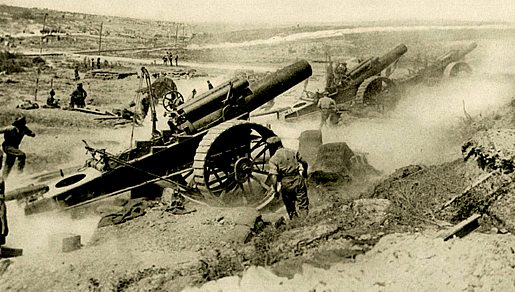
One hundred years ago today a Bosnian Serb named Gavrilo Princip assassinated Archduke Franz Ferdinand of Austria and his wife Sophie. The grand duke — the heir to the Austrian throne — was shot while traveling in what would today be called a motorcade. He was paying an official visit to Sarajevo in Bosnia-Herzegovina, which was then a province of the Austro-Hungarian Empire.
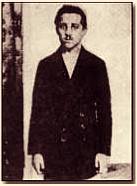 Princip’s action was the trigger for a four-year catastrophe that eventually became known as the Great War or the World War. Later events forced a renaming, and it became the First World War or World War One.
Princip’s action was the trigger for a four-year catastrophe that eventually became known as the Great War or the World War. Later events forced a renaming, and it became the First World War or World War One.
Four and a half years after that summer day, Bosnia, Austria-Hungary, and the entire traditional political order of Central and Eastern Europe had ceased to exist. The German, Austrian, and Ottoman Empires were no more. Austria and Hungary were no longer politically conjoined. The Russian Empire had been ejected from Central Europe, and its tsar had been replaced by a cabal of Communist revolutionaries whose murderous brutality would have made even the most bloodthirsty of the tsars blanch. Independent states sprang up where for centuries none had existed. Yet the variegated statelets of the Balkans were cobbled together into a single artificial entity called Yugoslavia whose weakness and instability suited the interests of the victorious Western Allies who created it. In contrast, the remains of the Ottoman Empire were carved up into political entities with arbitrary boundaries drawn by the same Allies, once again according to their own state interests.
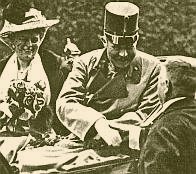 And so the world that we know today was created out of the ashes of the one that preceded it. The arrangements made by the victors after the Great War maintained and exacerbated earlier tensions while removing the inhibitions imposed by the now-discarded imperial structures. The result guaranteed an eventual reprise of the Great War. Armies and paramilitaries and revolutionaries and partisans rampaged across Europe in one direction or another, over and over again, until the entire continent had been soaked in blood, all except Sweden and Switzerland — which served as arms factory and banker, respectively, for the belligerents.
And so the world that we know today was created out of the ashes of the one that preceded it. The arrangements made by the victors after the Great War maintained and exacerbated earlier tensions while removing the inhibitions imposed by the now-discarded imperial structures. The result guaranteed an eventual reprise of the Great War. Armies and paramilitaries and revolutionaries and partisans rampaged across Europe in one direction or another, over and over again, until the entire continent had been soaked in blood, all except Sweden and Switzerland — which served as arms factory and banker, respectively, for the belligerents.
Gavrilo Princip’s gunshots opened the door to the charnel house known as the 20th century. The Great War was billed as the “war to end all wars”, but instead it ushered in a never-ending war. Cold, lukewarm, or hot: that war is still with us today, a hundred years later.
We’ve written before about the assassination of Grand Duke Franz Ferdinand and the fateful events of the summer of 1914, so I won’t be covering them in detail here. They began with Gavrilo Princip’s pistol shots and ended with the guns of August. The inexorable chain of events leading from the one to the other included (in chronological order):
- Austrian ultimatum to Serbia
- Evasive reply by the Serbs
- Bilateral conferences and consultations between different pairs of countries, with no meaningful result
- Mobilization of Austria against Serbia
- Mobilization of Serbia against Austria
- Austrian declaration of war on Serbia, followed by the bombardment of Belgrade
- General mobilization by Russia
- German ultimatum to Russia
- General mobilization by Austria
- General mobilization by France
- General mobilization by Germany
- German declaration of war on Russia
- German declaration of war on France, followed by the invasion of France through Belgium
- British declaration of war on Germany
- Austrian declaration of war on Russia
- French declaration of war on Austria
- British declaration of war on Austria
By August 12, all the major dominoes had fallen, and the Great War was underway. In the memorable words of British Foreign Minister Sir Edward Grey: “The lamps are going out all over Europe; we shall not see them lit again in our life-time.”
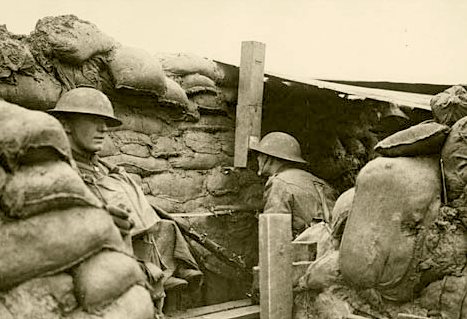
The unprecedented mechanized slaughter on the Western Front became the deepest single trauma experienced by the collective psyche of the Western world since the days of the Black Death. It began with the stalemate on the Marne in the fall of 1914 and continued for four interminable bloody years until the entry of the United States into the war and the attrition of German resources made an Allied victory possible.
The catastrophe of 1914-18 was not anticipated by any of the Great Powers, but it should have been. The Crimean war of 1853-56, and especially the American Civil War of 1861-65, provided a foretaste of what lay ahead at Verdun and Passchendaele. Yet the general staffs of Germany, Russia, France, and Britain had planned for a conflict that bore a closer resemblance to the Napoleonic Wars — the proverbial “last war”. Technological innovations — including long-range artillery, rifled muskets, the machine gun, and the tank — transformed the Great War into hellish indiscriminate slaughter. Yet no tactics had been devised to break the resulting horrific stalemate.
Mass conscription of cannon fodder for the front made certain that every city, town, and village gained a direct, immediate understanding of what modern warfare had become. A large proportion of fit young European men were killed, maimed, or “shell-shocked”. Virtually every family felt the effects.
It was through this universally experienced trauma that the Great War created the modern world. Later catastrophic effects extended and enhanced the trauma of 1914-18, infecting an entire culture with post-traumatic stress disorder.
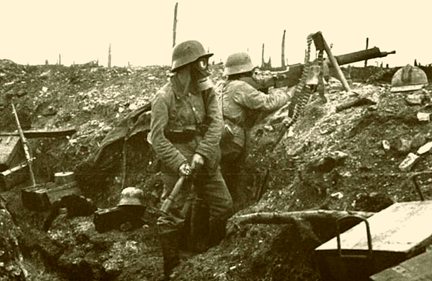
So many small decisions, so many enormous consequences. What would have happened if the German general staff had not decided to ship Vladimir Ilyich Ulyanov, a.k.a. Lenin, in a sealed train from Switzerland to the Finland Station in St. Petersburg in April 1917? What if Alexander Kerensky had remained as the head of the Provisional Government, keeping Russia in the war and forcing an earlier armistice?
What if Russia had become a republic? What if the Union of Soviet Socialist Republics had never formed?
What if… what if… what if…
But Revolutionary Communism did indeed slouch towards St. Petersburg, waiting to be born. It may be that Socialism had to come, no matter what. Lenin was certainly correct in his sense that revolution was in the air all across Europe, and especially in Germany, during those latter days of the World War. Within a decade, all right-thinking intellectuals were certain that Socialism represented an inevitable future. Who could resist it?
All the other “what ifs” echo down the decades from the days after the war. All those pivotal events, and the personalities that shaped them. Woodrow Wilson. The Fourteen Points. The Treaty of Versailles. Churchill’s hiccup. The Freikorps. The Weimar Republic. The inflation of 1923. The rise of the Labour Party in Britain. The Great Crash. Gustav Stresemann, Paul von Hindenburg, and Adolf Hitler. Ramsay MacDonald, Stanley Baldwin, and Neville Chamberlain. Guernica. The Rhineland. The Maginot Line. Blitzkrieg.
The dismemberment and distribution of the remains of the Ottoman Empire by the French and the British fashioned the Middle East as we know it today, with its artificial borders, ethnic fractures, rival ruling houses, and continuous fratricide. Oh, and the oil — whatever you do, don’t forget the oil.
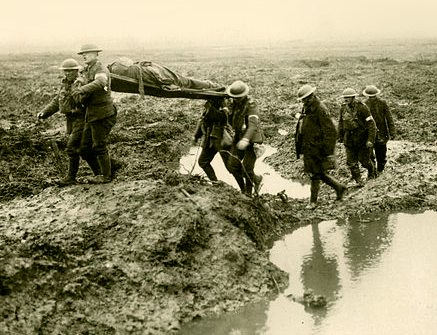
The destruction of a substantial portion of an entire generation was followed by a similar round of butchery inflicted on the next generation. A cohort of the strongest, most resourceful, and most courageous young men was wiped out — twice. The damage to Western culture inflicted by these events can scarcely be reckoned. The world before 1914 is all but unimaginable to those of us who never knew it.
In his landmark book The Great War and Modern Memory, Paul Fussell documented the long-term effect that the World War had on Western culture, especially Britain. Since it was published we have had more than forty additional years to remember what happened and try to make sense of what we have become.
The Great War destroyed the cultural self-confidence of Europeans. It catapulted cynicism and nihilism into the ascendancy, laying the groundwork for the cool, hip, ironic popular culture that plagues us today. It gave us modernity — and eventually, post-modernity.
The noble sentiments and patriotic fervor of 1914 were wiped out in the trenches, never to be fully regenerated. The second phase of the Great War in 1939-45 only accelerated the process, and the dedicated subversion of our culture by the Soviet Union during the Cold War made certain that what had once been the central underpinnings of our civilization could never be restored.
In the larger scheme of things, the Great War never really ended. Its destruction is still unfolding before us as the last remaining bastions of European culture are systematically deconstructed by the great-grandchildren of those who began the process.
The rise of modernity was already underway before 1914. It could be seen in the Fabians, “free love”, the Bloomsbury Group, theosophy, fashionable atheism, and all the other trends that have since become mainstream. But the Great War made it all happen so quickly, and leavened it with so much cynicism and nihilism, that the pillars of the old culture never stood a chance after the armistice.
On June 28, 1914, Gavrilo Princip’s gunshots ultimately brought down an entire civilization. We lost an innocence that can never be regained, and the vitality of our culture has been leaking away ever since.
It’s hard to see what will fill the vacuum left by the departure of Western culture when the Great War finally ends. No one knows the shape of things to come.
But whatever it is that’s coming will be here soon.

“The world before 1914 is all but unimaginable to those of us who never knew it.”
For what it’s worth, I have just begun reading a (c)2013 book titled “1913: In Search of the World before the Great War” by Charles Emerson. It is one of that small subset of books whose first title-word is a number. Other books in this sparse set include
https://en.wikipedia.org/wiki/1491_(book) [good]
https://en.wikipedia.org/wiki/1493:_Uncovering_the_New_World_Columbus_Created [not so good]
1914: The Year the World Ended by Paul Ham (May 2014)
You rightly peg WWI as the source of all our troubles. I’ve called it “Europe’s first suicide .” The two subsequent ones that followed are a direct consequence of that first one: WWII and, a century later, Death-by-Migra.
It should be noted that the success of the Bolsheviks was largely due to Lenin’s promise to pull Russia out of WWI, whereas the destruction of (what used to be great) Britain is a result of its upper-class, male ruling elite pushing that country ever deeper into the muck of death, with so many lions led and wasted by donkeys (hat tip to Field Marshall Sir Douglas Haig and other general bluebloods). Perhaps once the British mother lode was so shattered by its privileged male caretakers, American WASPs started withering too but militant feminism gained drive and vitality.
http://diepresse.com/home/zeitgeschichte/3829079/Karl-Habsburg_1914-kein-politischer-Wille-zu-grossem-Krieg
==
Habsburg sieht dennoch einen Hauptschuldigen am Krieg: “Ich sehe die Schuld beim Nationalismus in ganz Europa.” Im übrigen halte er es für nicht richtig, von einem Ersten und einem Zweiten Weltkrieg zu sprechen. “Es war EIN großer Krieg, denn die Resultate des Ersten Weltkriegs führten direkt in den Zweiten Weltkrieg.”
==
my translation:
[Karl] Habsburg nonetheless sees one primary culprit for the War:”I put blame at the feet of nationalism throughout Europe”. Further, he considers it misleading to speak of a First and a Second World War: “It was ONE great war, for the result of the First World War directly lead us to the Second Word War”.
my comment:
and it directly lead us to self-immolation, born out of a fundamentally racists Kollektivschuld, and a nihilism dressed as PC and multiculturalism, that we see proceeding and even gathering speed today.
If I may make one addition to my comment.
I should have capitalised “Multiculturalism”, for I meant the cancerous doctrine of Multiculturalism that we have today, rather than the organic multiculturalism that existed in the Austro-Hungarian Empire. My grandfather, born during in one of the last years of the 19th century, was in his late teens when the War broke out. He spoke Czech, Polish, Russian and of course German. As a child I was amazed how fluent he was able to communicate in those languages. He was not an intellectual but a common man, a product of organic multiculturalism.
He just lived long enough to see the events in Hungary culminating in the fall of the Berlin Wall and he was very touched by the events. I don’t know but I think for him it was a hope that the painful tearing and being appart that he had witness throughout his life would be able to be healed. Lucky he did not see the treachery of the doctrine of Multiculturalism that manifested.
Hello, doxRaven, that’s a pretty good translation. As I read (“red”) the German, I mentally translated it into English. Then I saw your English, which put my wooden rendering to shame (e.g. your “throughout Europe” vs. my “in Europe as a whole”, for “in ganz Europa”).
But the use of _lead_ in your translation and comment is a good example of something I have noticed a lot of recently: people thinking that the past tense of the verb _to lead_ (pronounced “leed”) is spelled _lead_ and pronounced “led”).
This is a beguiling notion, because that is exactly how the verb _to read_ (“reed”) behaves. The present, past, and past participle of this verb, with pronunciation, are
read (“reed”)/read (“red”)/read (“red”) = lesen/las/(hat) gelesen.
But with the verb _to lead_ (= fuehren), it’s
lead (“leed”)/led (“led”)/(has) led (“led”).
To further confuse matters, there is also a word that is spelled _lead_ but pronounced “led”: it is a noun referring to a metal (Blei).
Maybe someone with good Google-fu talent (I use duckduckgo.com) can search online for instances of _lead_ and take statistics on the proportion of the time it means _fuehren_ (present tense), _fuehrte_ (incorrect past tense), and _plumbum_ (the metal Pb).
— Mark Spahn (West Seneca, NY)
Jawohl, Mein Fuehrer- sorry, leeder!
George Kubler has suggested that there are only two significant velocities in the history of things:
– Glacier-like pace of cumulative drift
– Forest fire: leaping action across great distances when unconnected centres blaze into the same activity
We probably entered the third phase of the West’s longest suicide note in history on 11 September 2001.
If one looks at WW1 in a biblical way it is most interesting, If Gallipoly had been successful there would have been no need for Allenby’s foray into Southern Syria (Israel), and the Mandate may have been different. If Somme 1916 had succeeded, If Flanders 1917 had succeeded, there would have been no need for the ‘liberation’ of Israel. Proto-Israel in the form of the British Mandate was the direct outcome of Allenby’s invasion of ‘Palestine’, and the re-instatement of Israel is the trigger point of the biblical ‘End-Times’.
Now we see ‘ISIS’ and the possible fulfilling of Psalm 83, these are weird times that we live in, ISIS is in the process of surrounding and enveloping Israel, watch out Jordan, you are next…..
The last tyrant took over Czechoslovakia, Austria and Poland before the ‘west’ intervened, ISIS are taking Syria and Iraq, but the ‘Levant’ is also Jordan and Israel; “The Levant today consists of the island of Cyprus, Israel, Jordan, Lebanon, Syria, Palestine, and part of southern Turkey (the former Aleppo Vilayet).” (Wikipedia)
Let us beware, the worst maybe yet to come.
A few quibbles:
The Serbian reply to the Austro-Hungarian Empire was not evasive. It did everything the Empire asked except cede direct sovereignty to them.
A lot of the “Donkeys” leading those “Lions”(yeah a great quote but not particularly accurate in a military sense) died at the head of their men leading those attacks. The military art didn’t know better, and technology had (yet again) outstripped tactics and strategy. Tanks , air power, and better tactics overcame that stalemate . The cycle started again in 1939 and is still going.
The real collectivism problem was after WW II (or the second period if you prefer) when the silly lefties in the West elected Communists and their shadow brothers Socialists to power. We didn’t really recover from that disaster until the 1980s–and some, witness the current US “Administration”, still haven’t figured it out.
@Capt. Mongo
I posted the comment about the donkeys; for some reason my identifiers here disappear from time to time and if I don’t notice it , the comment comes out as anonymous. I stand by the “donkeys” coimment, even though there has been some recent reassessment of Haig. To see why — only if you are interested in military lore and gore — see my 2008 essay “The Last Samurai and Europe’s First Suicide” http://www.brusselsjournal.com/node/3470 .
“Blackadder Goes Forth” had it right. It’s the luckless lower-ranking officers, up to major, who sprang out of the trenches first. They were not the donkeys; they just followed orders issued by much higher-ranking donkeys ensconced far away with single malt scotch in hand. Gallipoli ditto.
WWI spawned poetry, literature, even cinema (e.g. Jean Renoir) of the utmost cynicism and revulsion of that war and of the ruling elites’ conduct in that war in the languages of all the countries that were mired in it, not just Great Britain.
Excellent essay, and I was familiar with the Port Arthur saga. I have read some of the revisionist material on Haig, too– and found it partially convincing; though some of it comes across as plain “Let’s tear down Churchill” and some as a rather labored attempt by an academic to find a “New” subject to publish. Still, instructional in many ways.
I fear you stray a bit when belaboring subsequent tactics. It was not that the leaders didn’t know better–(at least some of them, anyway), it’s just that they lacked the tactical means to do it differently. “TOT” artillery of the right type, “Walking barrages” and the sheer volume of artillery necessary were simply not in existence in early WW I–and those were the primary means of getting the infantry through the wire where it could do its job. The Germans made very similar errors–even worse in some ways–during their Marne offensive of 1914 ( The “Boy” Battalions” come to mind).
Likewise, the American “Army” of 1917 was really a partially trained mob of mostly farm boys. Their officers not really better. You can make the case that Pershing should have allowed his manpower to be used by the veteran French and British commanders–but he didn’t. Therefore the US Army–incapable tactically of doing much else–repeated the casualty heavy tactics of 1915-16 in 1917.
An interesting take on Japanese military culture. Nogi was venerated for his victory; and we saw echos of the same culture (purity of will and training overcomes technology) during WW II. We all know how that worked out.
Takuan, we so often disagree, I’m delighted to salute a fellow-fan of the great Jean Renoir. I know Americans in particular seem to have an aversion to foreign-language films (sometimes doing inferior remakes), but urge readers to see “La Grande Illusion”.
Renoir was of course a son of the painter; he served in WW1, and wrote a semi-autobiographical novel, “The Notebooks of Captain Georges”, based on his experiences. On the BBC’s “Desert Island Discs” a while back, Gene Wilder chose it as his optional book in addition to the compulsory Bible and Shakespeare.
Renoir’s great fellow-director, Marcel Carne, made the ultimate resistance film, “Les Enfants du Paradis”, under the noses of the Nazis- screening was delayed till the Germans were out of Paris. The actor playing the nasty, gossipy tinker, Jericho, had to disappear as he was on the Resistance’s hit list; he was replaced by Renoir’s brother Paul. Apologies to non-film buffs!
From the outside, looking in . . .it appears repercussions to Sweden’s participation as an arms factory is being addressed with the current demographic shift via cultural invasion/ethnic genocide.
There is an interesting quote from W. Somerset Maugham concerning Swedish neutrality and how they profited from it. He wrote this between the wars:
“The Swede is very adept at the gentle pastime of fishing in troubled waters.”
Photo Essay from Israel’s Picture-A-Day: WW100 — World War I and the Jews of Palestine, Commemorating the Centenary since the Outbreak of the War to End all Wars
If you read about the 30 Years War you must realize that Europe has been doing this type of thing for a very, very long time. The Treaty of Westphalia ended wars of religion as Europe didn’t have 4 or 5 years of slaughter but 30 of them, so to my thinking WWI and WWII are really part of a much older 400 year war.
The left (Nazis, Fascists, Communists and Socialists) is terrific at tearing things apart and tearing things down. They always act liked spoiled children, but like spoiled children they can create nothing useful in its place. Their 20 ht century dystopias are proof.
Now that the West has lost its nerve and its roots, we have a 1,400 year old organized crime syndicate/cult masquerading as a religion that seeks to fill the vacuum. The left should be utterly opposed to Islam but embraces it as useful, a source of votes and a cudgel to beat what is left of Western civilization. In time I predict they wish they hadn’t.
‘doxRaven’ uses the German word ‘Kollektivschuld’ in his comment.
My German isn’t good but I guessed this as ‘Collective guilt’ (a term German’s are fond of using !) and Google translate confirmed this.
Hope this helps other non-German readers.
The wars did not end until the driving force behind them, that is the belief of the German military and political elite that war was quite acceptable as a means to achieve political ends. That theory died completely in April 1945, when 3 million or so Russians fought into and occupied Berlin, thoroughly rubbing the faces of the German elite in “it”. Our German friends have been quiet as mice since then.
roger, I think we can safely say that war is the natural continuation of politics that has gotten out of hand. Is it war or peace that man is most happy with? You blame Germany when it required all the nations involved to stage that war.
In retrospect these events seem uncanny, like the script for a gigantic, nightmarish play. There seem to be powers involved that are beyond our ken.
Roger–
Your explanation deals with the Germans as if they had invented and thereafter owned this “drive “ to conquer. And as if their quiescence were the actual end of something.
You could go back to the belief of France, Sweden, etc., that it was OK to rampage through the various German-speaking states and micro-states; followed by the clash of imperial French ambitions with imperial English ambitions, and both of them with the imperial ambitions of Spain; to say nothing of the mutual wars of conquest and attrition to the east, among Germans, Poles, Lithuanians, Russians; or the dual incursions of Islam into eastern Europe to the walls of Vienna and through Spain to the fateful clash with the Franks; or the inexorable march of the Roman empire to the north, west, east and into North Africa, much of it “provoked” by opponents; or Alexander’s unquenchable desire to not only see, but possess, the known world; or Attila, who terrified the Roman empire, driving toward the Atlantic; etc., etc., ad infinitum.
And if our German friends have been quiet as mice, what about the Chinese. And how did it happen just recently that Crimea changed hands? The ”drive” is as old as the life expectancy of a vampire. This was not the war-to-end-all-wars, but as the title suggests, the war that never ended and never will. We ignore human nature and believe we can alter it at our own peril.
jlh,
It is difficult to be both succinct and to accurately portray such a complex subject as 20th Century history in a short blog post response. Certainly Germany has no monopoly on the drive to conquer, they didn’t invent it and they weren’t the first, or will be the last, to use it. However in the context of the outbreak of WW1 and the aftermath of that conflict it is crucial to understand the effect of the peculiar political structure of the Kaiser’s Germany and in particular the martial nature of that state with it’s almost total lack of civilian political control of the armed forces. Austria would not move against Serbia without a guarantee of German support, they got that support because the German army command council considered that their aims could be achieved by the war that would inevitably result from that guarantee. They had analyzed the predictable responses of the major participants, Russia and France, and planned their campaign accordingly, they had been working on these plans for many years.
It is my point that the wars against German military aggression ended with the total defeat of Germany in 1945, Germany has not threatened anybody since then and shows no sign of ever doing so again. That does not mean that all wars have ended or that the use of war to further a political agenda is a thing of the past, it very obviously isn’t.
As for post WW2 military activity, you mention China, why? China has defended it’s borders against hostile forces (Korea, Indo-Chinese war, Vietnam) but has not embarked on any expeditionary force type activity. In fact the nation that has consistently engaged in aggressive wars is our own United States, with largely failed campaigns from Korea through Vietnam, Iraq and Afghanistan. It is the United States that maintains a massively bloated military and bases worldwide from which it affects (or attempts to) regional and global politics. In the world that is emerging in the 21st century this is extremely dangerous, so dangerous in fact that at least regional nuclear wars are now inevitable, and any conflict between USA and China will be nuclear from the outset.
Well Roger, the US has not always been perfect- who has?- but I recall an episode of BBC TV’s “Question Time” a couple of years ago, where one of the panellists came from a right-wing think tank.
He was somewhat smug and arrogant, not endearing himself to the studio audience or myself, but pointed out that if people didn’t like a world where America was the dominant power, they certainly won’t like it when China is.
Yes, I hear that old South Koreans are grateful while young South Koreans are nasty about the Americans guarding their border with their Communist ‘kin’ to the north.
If true, then the young South Koreans are the biggest fools who have ever lived – considering that the North Koreans would love to overrun South Korea and make it theirs….
Now, why Americans have many thousand more guards on the border of South Korea than on the southern border of our own country is a salient topic. Evidently, SOME national borders count – just NOT our own national borders….
Roger
I understand your point about Germany. It just seemed like a stand-alone when I read your comment.
As to China, Tibet was not within their borders, but now is, as would Taiwan be, if not for our bloated armed forces and the willingness to flaunt them, and–given the present administration–Japan and South Korea are justifiably nervous.
As to nuclear war being inevitable, it is what most of us thought throughout the Cold War, but China is tough and intelligent enough to see that expansion of their naval forces is very advantageous, just as we are cutting back, and this expansion and the increasingly aggressive attitude toward its neighbors is causing Japan–which resembles Germany in its post-war desire to live quietly and make money–to re-think the strength and reach of its post-war armed forces, which–like Germany’s–have not really been necessary until now.
It wasn’t just one guy who assassinated the Archduke. It was a terror cell of Bosnians.
“We can make some generalizations about the plotters. All were Bosnian by birth. Most were Serbian, or one might say Orthodox, but one was a Bosnian Muslim [Mehmed Mehmedbasic]…”
Were the Serbians influenced by dhimmi reflexes inherited from their collective historical memory of subjugation under Ottoman Muslim rule? Have historians adequately investigated the possible Islamic angle of the assassination? After everything I’ve seen in many other related contexts, I wouldn’t trust they have.
http://www.firstworldwar.com/features/balkan_causes.htm
Most historians don’t seem to have looked at the Muslim angle in hardly any European history (with such exceptions as Pirenne). I got my first clue of that when I noticed in the Czechoslovak Declaration of Independence, that the Czech nobility voluntarily elected a Hapsburg as king of Bohemia because of the “Turkish menace”, in 1526, according to Wikipedia. That was the same year that the Holy Roman Emperor, Charles V, made his speech at the Diet of Worms, recommending that Luther be barbecued a la Hus. According to Roland Bainton in HERE I STAND, nothing came of it because the Turks “were pounding on the gates of Vienna” and he couldn’t afford a fuss with the German Electors at that time. By the time Charles got to Wittenburg with an army, Luther had died of natural causes. According to Wikipedia, the Hungarian nobility also elected a Hapsburg king at the same time for the same reason (specifically, Charles’ brother Ferdinand in both cases), in fact, they were first in line to receive a Turkish invasion. Ferdinand lost most of Hungary on the first round, but saved Bohemia. Eventually the Hapsburg’s did get Hungary back as well. Thus, we have to thank the Turks for both the Austo-Hungarian Empire and the Protestant Reformation. Frankly, I think that this is just the tip of the iceberg.
At the meme level, what happened in Europe that led to WW1 is exactly what is happening to Europe today. The notion of PCMC appears in these pages often. But the focus is always on the “MC” side rather than the “PC” side. What drove and sustained both the European leaders as well as those that shouldered arms and went to die in the trenches, was a political correctness of a nationalistic kind.
Following the end of WW2, all of the “good and right-thinking” people decided it was nationalism that caused the world wars, and ran as far away from that as they could, right into the arms of nationalism’s doppelganger, multiculturalism. But it wasn’t nationalism that was the problem. It is rather the societal forces we call political correctness that is the problem.
Nobody seems to want to admit to themselves how easy it is to be manipulated by others via a process of shaming. Once a meme set becomes dominant in a society, a herd mentality takes over, and only those with a sufficiently strong sense of self, can stand apart. Most people are more than willingly to go along with whatever everyone else is doing. After all who wants to be different? And for those that can’t/won’t/don’t conform to the popular opinions of the “in-crowd” the process of enforcement we call political correctness awaits them. This takes the form of name-calling, shaming, ostracism, harassment, lawsuits, followed by physical threats and personal violence.
In other words, it’s not multiculturalism or nationalism or any other “ism” that is the problem. The problem that afflicts humankind lies in our ability, at a societal level, to fall into dysfunctional and even self-destructive herd behavior patterns; patterns that once a society gets trapped into, can’t get back out of short of some major catastrophe.
In the early days of the 20th century, Europe was already primed, at the meme level, for a major war. Gavrilo Princip didn’t start WW1; he was just the black-swan event that set the dominoes falling. In terms of the strength levels of political correctness dominating European society today, we are back to where those levels were in the days leading up to WWI.